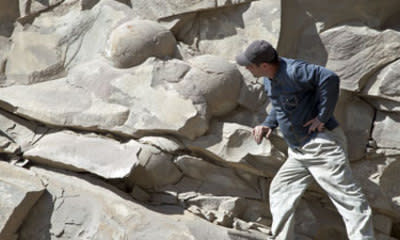'Workmen Find World's Biggest Dinosaur Eggs'

A construction crew in Russia's Chechnya may have uncovered an unusual find - a stash of giant dinosaur eggs.
They were blasting through a hillside in a remote area of the Caucasus mountains, aiming to build a road near the volatile region's border with Georgia at the time.
A team of geologists looked at the smooth, oval rock-like forms and it was not long before they began to believe they were staring at huge fossils.
The eggs range from 25 centimetres to one metre in size.
"The discovery is sensational not only for our republic, but because of the size of the eggs," a spokesperson for the Chechen State University said.
"There have never been such large (eggs) in the world."
One of the geologists, Said-Emin Dzhabrailov, said: "We've found about 40 eggs so far.
"There could be many more laying under the ground."
He said palaeontologists were needed to determine which species of dinosaur had laid them.
Mr Dzhabrailov said the regional Chechen government, which is eager to shed the region's reputation for violence, is considering turning the area into a nature preserve and seeking to attract tourists.
But a palaeontologist in Moscow questioned the authenticity of the reported discovery.
"Unfortunately, it's not true. Dinosaurs laid small eggs," said Valentina Nazarova of the Moscow State University's paleontology department.
Ms Nazarova said dinosaurs probably never lived in the mountainous North Caucasus.
"Dinosaurs didn't lay eggs while jumping about like mountain goats," she said.
"I am sincerely sorry for them, but I also wouldn't want to go against science."
The discovery claims come as a University of Zurich study suggests laying eggs led to the dinosaurs' downfall after ruling the Earth for 150 million years.
The direct cause of their extinction 65 million years ago is believed to be a massive asteroid that smashed into the Earth off the coast of Mexico.
But it was the fact dinosaurs hatched out of eggs that ensured they could not survive the catastrophe, the evidence claims.
After the asteroid impact, which altered the Earth's climate, all larger animals on Earth weighing more than around 25 kilograms perished.
That included the giant dinosaurs such as Tyrannosaurus rex and the mighty plant-eating Titanosaurs.
While some small dinosaurs took to the air and evolved into birds, mammals took over ecological niches filled by medium-sized animals.
Medium-sized dinosaurs were virtually absent - because of egg laying, say researchers.
Hatching out of eggs, large dinosaurs began their lives much smaller than adults.
As they grew, and their body size expanded, they occupied niches that would otherwise have provided a home for medium-sized dinosaur species.
Mammals, which give birth to bigger live babies, were able to diversify into numerous medium-niche species without being crowded out by their own growing offspring.
The research, based on computer simulations, is published in the Royal Society journal Biology Letters .
The reason big dinosaurs began life so tiny is that there are physical limits to how big eggs can become, the researchers claim.
Larger eggs require thicker shells, through which oxygen must be able to pass.

 Yahoo News
Yahoo News 